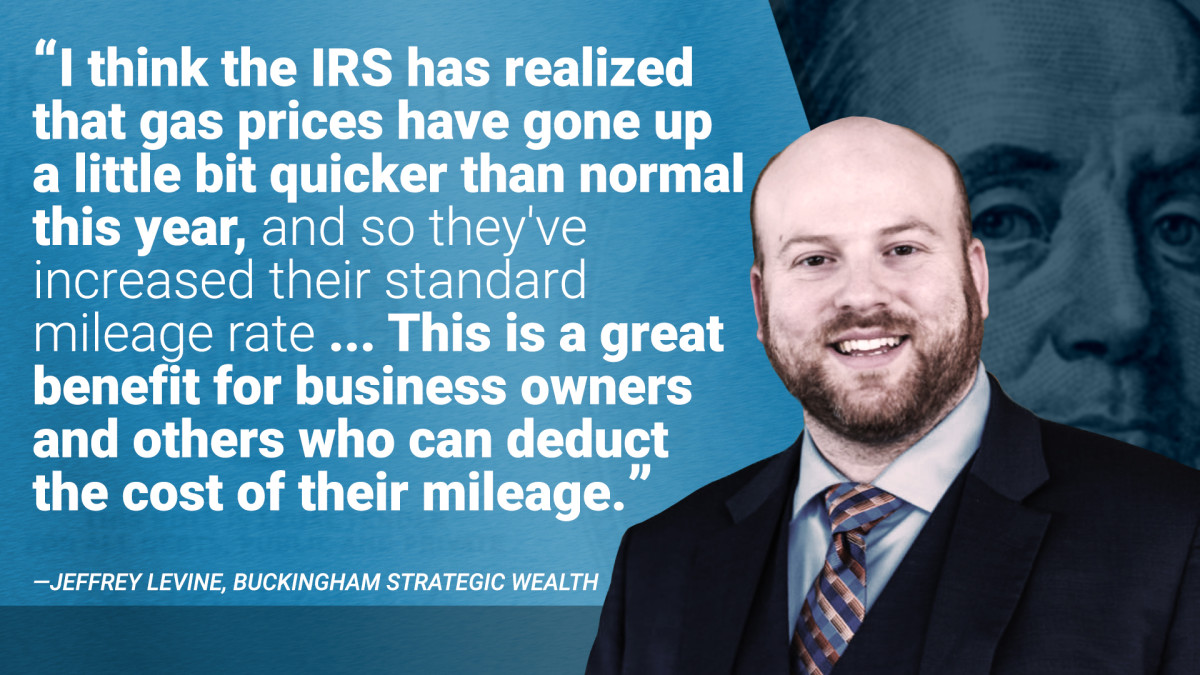Wondering how the IRS increasing standard mileage rates affects your taxes?
Retirement Daily’s Robert Powell caught up with Jeffrey Levine, CPA and tax pro from Buckingham Strategic Wealth Partners, to answer that question and more.
TurboTax Live experts look out for you. Expert help your way: get help as you go, or hand your taxes off. You can talk live to tax experts online for unlimited answers and advice OR, have a dedicated tax expert do your taxes for you, so you can be confident in your tax return. Enjoy up to an additional $20 off when you get started with TurboTax Live.
Recommended Read: Standard Mileage vs. Actual Expenses: Getting the Biggest Tax Deduction
Quotes| IRS Increasing Standard Mileage Rates Jeffrey Levine, Chief Planning Officer, Buckingham Strategic Wealth Jeffrey Levine, Chief Planning Officer, Buckingham Strategic WealthVideo Transcript| Jeffrey Levine, CPA and Tax Expert, Buckingham Strategic WealthRobert Powell: What do taxpayers need to know about the IRS increasing the standard mileage rates for the last half of 2022? Well, here to talk with us about that is Jeffrey Levine from Buckingham Strategic Wealth. Jeffrey, welcome.
Jeffrey Levine: It’s good to be with you, Bob.
Robert Powell: So the IRS giveth.
Jeffrey Levine: Yes it’s nice, right? The benevolent IRS. I think the IRS has realized that gas prices have gone up a little bit quicker than normal this year, and so they’ve increased their standard mileage rate. Now, what does this mean? Well, this is a great benefit for business owners and others who can deduct the cost of their mileage. Now, it’s very important to realize that if you are using the standard mileage rate, you either need to be a business owner yourself and taking that on your own return, or it could be an expense that you submit to your employer and your employer reimburses you for those miles.
And that’s true even if you own your own business, let’s say as an S corporation where you are the employee of your own business. As the employee of the S corporation, you cannot take that deduction, but you could submit your mileage to your employer, which is you, and have that employer reimburse you those dollars. And that’s because in 2017, when they passed the Tax Cuts and Jobs Act, they eliminated the miscellaneous itemized deductions and unreimbursed the business expenses of employees are miscellaneous itemized deductions. So no longer is it valuable there, but it’s still valuable for business owners and those who submit reimbursable expenses to employers.
Robert Powell: Right, what about individual taxpayers who are driving to and from a charitable board that they may sit on?
Jeffrey Levine: Yes, so you actually are able to deduct charitable mileage, but the business mileage rate is different from the charitable mileage rate. The charitable mileage rate is much lower. And the other thing that’s really critical here is that when you’re deducting the charitable mileage rate, it’s as a charitable contribution, which is a below-the-line deduction. And many individuals, most individuals today, don’t itemize their deduction. The standard deduction is so high that a lot of taxpayers, most in fact, over 90%, don’t have enough itemized deductions that they actually exceed the standard deduction. And so those charitable miles in that case would unfortunately provide no benefit.
Editor’s Note: The content was reviewed for tax accuracy by a TurboTax CPA expert.
Zach Faulds contributed to the writing of this article and produced the video and/or the graphics associated with it.
